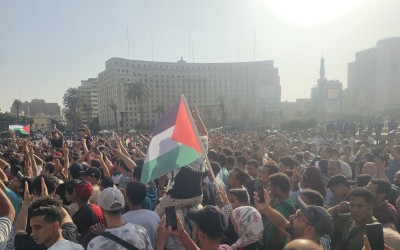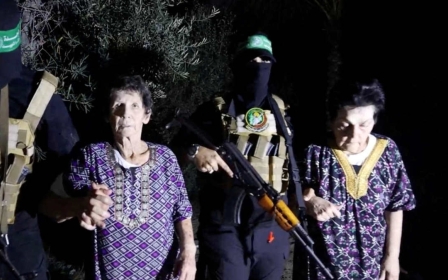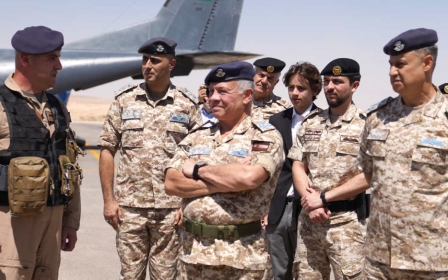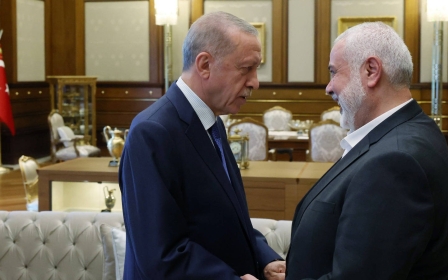Israel-Palestine war: Where's Nasrallah? Hezbollah leader silent amid Gaza attacks
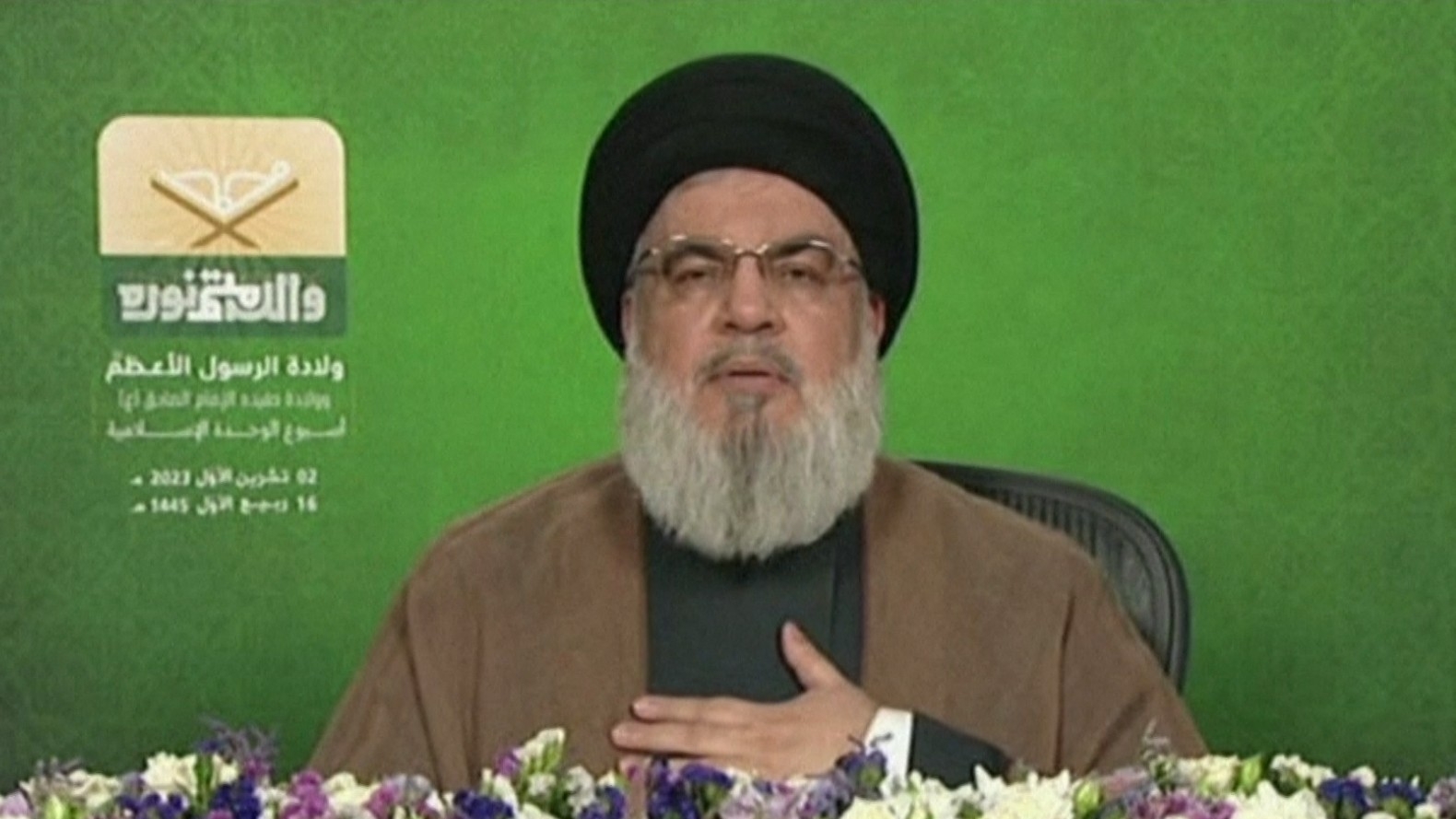
In Lebanon and other parts of the Arab world, it has become almost a tradition to tune into the speeches of Hassan Nasrallah, Hezbollah’s secretary general, particularly when there are major developments in the region.
Observers try to anticipate what decisions he might announce for the party - whether that be in Lebanon, Syria or elsewhere.
Yet while the Lebanese movement’s fighters have been clashing with Israeli troops along the border, Nasrallah himself is noticeably absent, with no speech forthcoming, much to people’s surprise.
For now, Hezbollah-Israel skirmishes have been contained to targets just over either side of the border. Hezbollah says at least 36 of its fighters have been killed in combat, along with an unclear number of Israeli casualties.
The Lebanese movement began attacking Israel soon after a Hamas-led assault struck Israeli communities near the Gaza Strip on 7 October, killing around 1,400 Israelis. A relentless Israeli bombing campaign on Gaza has since killed more than 5,700 Palestinians.
New MEE newsletter: Jerusalem Dispatch
Sign up to get the latest insights and analysis on Israel-Palestine, alongside Turkey Unpacked and other MEE newsletters
Many fear these clashes on the Lebanese-Israeli border will evolve into a regional war that could be more destructive than the month-long conflict Hezbollah fought against Israel, to a stalemate, in 2006.
Hezbollah has organised rallies, held funerals for its fallen fighters, and had senior officials threaten to escalate, should the current situation call for it.
The border clashes alone have caused Israel to evacuate areas near Lebanon, and over 19,000 Lebanese have been internally displaced.
Nasrallah’s silence has only added to the uncertainty, with experts believing an expected Israeli ground invasion of Gaza could trigger a public reaction from the Hezbollah leader.
“The issue is about what will be the nature of the land invasion,” Joseph Daher, academic and author of a book on Hezbollah, told Middle East Eye.
Daher believes the scale of violence, and how much Israel will be able to harm Hamas, will be the determining factors.
'It confuses the enemy'
In an interview with pro-Hezbollah pan-Arab outlet Al Mayadeen, Hezbollah MP Hassan Fadlallah said that Nasrallah has been overseeing the group’s battles from behind the scenes, and that his absence from the public eye is part of this strategy.
“It also confuses the enemy more,” he said. “As it is said, ‘If you are absent, he will tremble; if you speak, he will be defeated.'”
A Hezbollah spokesperson told MEE that the group is not releasing statements on the matter at the moment. But on Tuesday, a journalist with Hezbollah's al-Manar shared what appeared to be a teaser for a Nasrallah speech, with the caption "wait for him".
Qassim Qassir, a political analyst close to the movement, told MEE that Hezbollah’s officials are “keeping pace” with developments on the political and media scenes, and haven’t yet found the need for Nasrallah to appear.
“He will appear when necessary,” Qassir said, claiming that a ceasefire or a declaration of “total war” might be the catalyst.
Follow Middle East Eye's live coverage for the latest on the Israel-Palestine war
Nasrallah’s silence can also be interpreted as a sign of Hezbollah’s own surprise at the scale of Hamas’s attack, according to Mohanad Hage Ali, senior fellow at the Beirut-based Carnegie Middle East Center.
“Nasrallah’s messaging is always forceful, forcing and threatening red lines against Israelis,” he said. “Given that the organisation has not prepared for this new level of escalation, I suppose it is trying to keep all options open.”
During a visit to Israel’s northern border on Sunday, Prime Minister Benjamin Netanyahu said that Hezbollah would be making “the mistake of its life” if it chooses to formally join the war.
“The consequences for Hezbollah and for the state of Lebanon will be devastating,” he told troops there.
Potential backlash
Hezbollah’s powerful arsenal, which strongly outweighs that of Hamas, along with the group’s proven ability to fight Israel to a standstill in the past, leads experts to be less certain about the outcome of a wide confrontation.
It also has recent combat experience in the Syrian war, where it has fought successfully alongside President Bashar al-Assad’s forces.
The backlash Hezbollah could face internally over a potential war could, however, be severe.
“The conflict will define the Lebanese political debates and polarisation for much time to come after this,” said Hage Ali. “I don’t see Hezbollah getting away with it, politically, after the conflict is done.”
Daher says many in Lebanon, including political groups sympathetic to the Palestinian cause, do not wish to see their economic crisis-hit country involved in the current conflict.
Yet the continued Israeli bombing of Gaza, the sharply rising death toll there and the prolonged clashes on the border have increased the anger and frustration among Lebanon’s population.
After the reported Israeli strike on al-Ahli Arab Hospital on 17 October, Lebanese streets were filled with protesters condemning Israel. In one area, Hezbollah supporters could be heard begging Nasrallah to declare war.
In a pro-Palestine rally in Egypt, some protesters were seen cheering on Nasrallah, telling him to “bomb Tel Aviv” and “listen to the voice of the free people”.
According to Qassir, “the return to raising slogans demanding a role for Hezbollah and Sayyed Hassan Nasrallah” confirms Hezbollah’s status as a symbol of Arab resistance against Israel, as well as the part it may play in the event of an escalation.
On a regional scale, Hage Ali sees this as a chance for Hezbollah and its backer, Iran, to regain the significant appeal among the Arab public they enjoyed following the 2006 war and the liberation of south Lebanon from Israeli occupation in 2000.
“All of this will be a defining moment for the Iranians, if they succeed in this,” he said.
Middle East Eye delivers independent and unrivalled coverage and analysis of the Middle East, North Africa and beyond. To learn more about republishing this content and the associated fees, please fill out this form. More about MEE can be found here.


